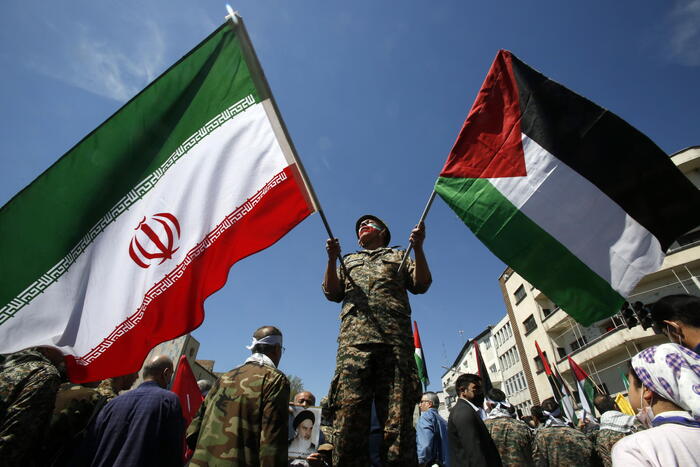The regime in Tehran has finally executed Alireza Akbari, a British-Iranian citizen accused of carrying out espionage activities for MI6, the UK's foreign intelligence service.
Prime Minister Rishi Sunak has strongly condemned Akbari's hanging, which Downing Street had been trying to prevent for more than three years.
"I am shocked by the execution in Iran of the British-Iranian citizen Alireza Akbari," Sunak wrote on his official Twitter account.
“It is a cruel and cowardly act, carried out by a barbaric regime that does not respect the human rights of its own citizens.
My thoughts are with Alireza's family and friends today."
The Foreign Secretary, James Cleverly, used a tone similar to the Prime Minister's in his reply,
but he raised the level of forcefulness by accompanying his words with the threat of reprisals.
“This barbaric act calls for condemnation in the harshest possible terms.
It will not go unanswered," Cleverly warned.
Akbari, who rose to the position of Iran's deputy defense minister two decades ago, during the government of the reformist Mohamed Khatami, was arrested in 2019, during a visit to his country of origin, and convicted shortly after for alleged espionage activities.
The Iranian national justice news agency, Mizan, announced on Saturday that Akbari had been hanged, without specifying the exact date of the execution.
The current intelligence minister, Ismael Khatib, described the convicted man as "one of the most important agents of British espionage deployed in Iranian territory."
However, BBC Persia had broadcast last Wednesday an audio recording of Akbari, whom his wife, a resident of the United Kingdom, was able to visit in prison.
The prisoner, transferred during his last days of life to a solitary confinement cell, explains in the recording how he had been deceived three years ago, when he was already residing in the United Kingdom.
A senior Iranian diplomat, he says, had invited him to return to the country, to discuss all the negotiations carried out with the Western powers regarding his nuclear capacity.
As soon as he set foot in Iran, he was arrested.
They accused him of having obtained top secrets from Iranian intelligence through Ali Samjani, the secretary of the Supreme National Security Council, whom he would have bribed, according to the regime's account, "with a bottle of perfume and a shirt."
The exhaustive account of the Mizan agency ensures that Akbari came to receive several payments from the British security services worth two million, 300,000 and 56,000 euros, respectively, through bank accounts in Austria, Spain and the United Kingdom.
The regime claims that the convicted man was trained in the United Kingdom in methods to gather information, hide his tracks, create shell companies that mislead the Iranian authorities or even resist possible interrogations.
In his recording, Akbari claims he was tortured and interrogated by Iranian secret service agents "for more than 3,500 hours."
“Through the use of psychological and physical methods, they managed to break my will, they drove me to madness and they took from me what they wanted (...).
At gunpoint, and with death threats, they made him admit to false accusations of corruption,” he explains.
The family and the British Government had kept the efforts to try to release the detainee at a very discreet level, encouraged by the false hopes of a solution that, according to them, Tehran did not fail to offer.
The country's regime, however, does not recognize the dual nationality of its citizens, and has never admitted that Akbari was British.
In the audio broadcast by BBC Persia, the convicted man accuses the authorities of using his execution "to take revenge on the United Kingdom."
Downing Street has imposed sanctions in recent months on certain relevant Iranian personalities, at the head of the so-called morality police and other security forces, as punishment for Tehran's violent response to the protests unleashed by the death of the young woman. 22-year-old Kurdish Mahsa Amini in September last year.
She was arrested for wearing the mandatory hijab (veil) in an "improper" way, and died in police stations.
Akbari's wife assured some British media that her husband had been "the victim of an internal power struggle" in the regime.
The current intelligence services would have acted against him to weaken Samjani – whom they accuse of having been bought.
He was Minister of Defense during the years of the moderate Khatami, and the two had maintained a great friendship ever since.
The maneuver supposedly has to do with the intense debate that exists in the highest echelons of Iranian power about the need to return to the path of self-restraint agreed with the international community, regarding the nuclear development program deployed by Tehran.
Follow all the international information on
and
, or in
our weekly newsletter
.

/cloudfront-eu-central-1.images.arcpublishing.com/prisa/KFCIT2GCC4NNUIU2JLBRW4G4XU.jpg)









/cloudfront-eu-central-1.images.arcpublishing.com/prisa/KMEYMJKESBAZBE4MRBAM4TGHIQ.jpg)



